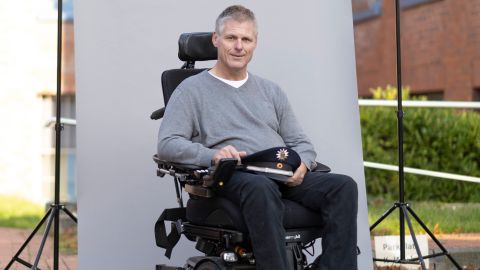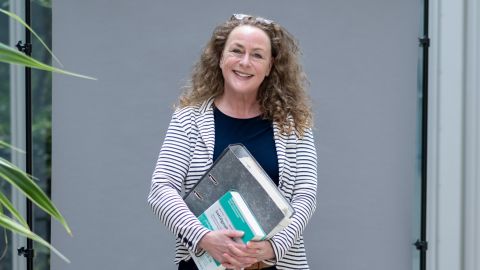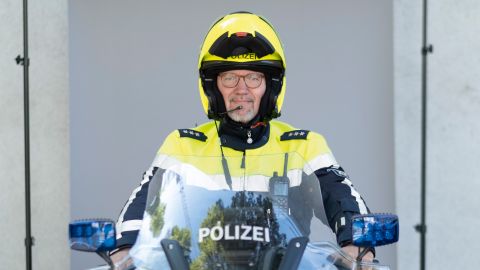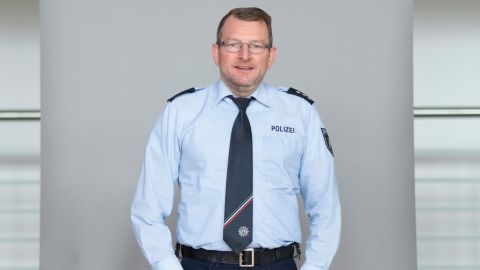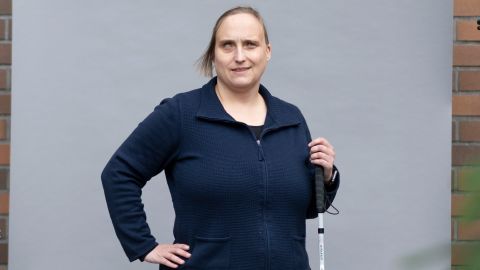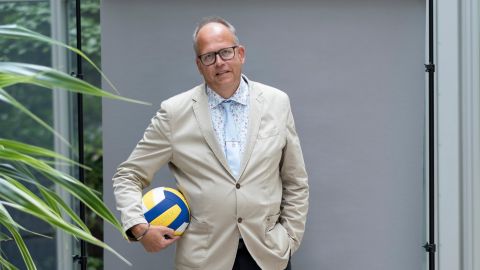Six examples of a career with a handicap: how Svenja Buir, Julia Hahn, Dirk Rohde, Marco Herschbach, Detlef Lammers and Thomas Börger master their fates with courage and positive energy and provide great services for the police in NRW with their disabilities.
"A lot is possible," says Detlef Lammers in Coesfeld. The First Chief Superintendent of Police is dependent on a wheelchair following an accident in his private life. Next year, he will be celebrating his 40th anniversary with the police. And he is very proud of it. The police force in North Rhine-Westphalia offers jobs to 5,000 colleagues with disabilities. A career despite disabilities is possible both in patrol duty and at the desk. At 7 percent, far more people with disabilities are employed in the police service between the Weser and Rhine rivers than is required by law (5 percent).
September 17, 2013 was a Tuesday. Detlef Lammers (58) was working late, in the middle of building a house and sawing boards in the attic. A nail was stuck in a rafter. It got caught in the circular saw and this rotating, extremely sharp tool drilled into Lammers' heel. He fell five meters to the ground. Spine shattered, paraplegic. What do you think when you get the diagnosis? Lammers says: "I didn't have time to think about it, I had to finish building my house first." As a team leader at the Coesfeld control center, he knew how to deal with crises. Now he was organizing tradesmen and volunteers from his bed. Colleagues carried tiles into the house, primed the walls, laid insulating wool - and later helped in the garden. "I was overwhelmed by so much help." Five months later, he was back at his desk - only in a wheelchair instead of a chair. "Everything was handicapped accessible," he says. Only electric door openers were missing. These were retrofitted.
Today, nine years later, Lammers parks his converted Multivan T6 in front of the police station in Dülmen, where he heads the traffic control center. He operates the accelerator and brakes by hand. He swings himself into an active wheelchair on the passenger side and drives to work via a ramp. In his office, he hangs photos of the police unit in Bochum. He was a platoon leader there for a long time. Today, he has staff appraisals, team meetings and a safety plan to write. In case African swine fever reaches the district.
He needs a folder high up on the shelf. Do colleagues need to help? "No, no," waves Lammers off and presses the joystick on his F5 - an electric stand-up wheelchair with front-wheel drive. The Integration Office has approved the expensive office chair, worth 28,000 euros, so that Lammers can stand up from time to time and relieve the strain on his damaged spine. Standing up? He puts on a chest strap, fixes his legs with a splint and presses a button. The seat cushion and backrest rise up, positioning themselves vertically and with them the First Chief Inspector. Lammers fetches the folders. A lot has changed since the accident. "But a lot is also possible," he says. In October 2023, he celebrates 40 years of service. "A gift." He didn't have to give up his biggest hobby, sport, either, he just had to change disciplines: wheelchair basketball instead of soccer and handcycling instead of jogging. This season alone, he clocked up 1,000 new kilometers.
"I was overwhelmed by so much help."
Detlef Lammers
People are often so good at their job precisely because they have gained the necessary experience themselves. This group includes Svenja Buir, an administrative officer at the Düsseldorf Ministry of the Interior who deals with career changes, police disability and disability law. Her career path: She joined the police in the early 1990s as a middle-ranking officer and spent many years at Cologne Police Headquarters, in the police squad, in the criminal investigation department and in the security service. However, the passionate sportswoman did not remain a police officer because she ruined her knees playing tennis and skiing at a young age. To date, the Bielefeld native, who has a degree of disability (GdB) of 40, has had ten operations on the sensitive joint.
The negative vote in the police medical examination is a shock for the now 50-year-old, who is also pregnant at the time. This was followed by a career change (including new training), first within the police force in the cathedral city and then to the HR department. Buir remembers it well: "They assured me very firmly that there was exciting work waiting for me in administration too." The encouragers were right. She was soon promoted to the higher civil service, which meant another three years of school. "Studying for promotion wasn't easy as someone living separately with a small child. I sometimes ask myself today how I managed it."
In 2019, she moved to the Ministry of the Interior in Düsseldorf. "On the one hand, I am the point of contact for authorities who have to solve difficult individual cases. I also advise police officers who are about to change careers," says Buir, describing her main tasks. She has found that police officers are often plunged into a major (life) crisis when they are no longer able to carry out their profession, which many of them define themselves by, due to illness. "That's when I come in. I not only show them what great opportunities there are in administration. But also what advantages this change brings." And Svenja Buir can do this without compromise. Because: "I still feel like a police officer, but I don't want to change jobs. I've been doing things for 20 years that really give me a lot of pleasure."
"I still feel like a police officer, but I don't want to swap."
Svenja Buir
Cancer defines the life of Dirk Rohde, but in a different way than you might think. The police officer from Cologne has survived cancer - and is now fighting for others. With full commitment. As the face of an awareness campaign, as the founder of a self-help group, as a blogger and podcaster, as a volunteer patient carer and, and, and. It's hard to imagine that the 58-year-old still works full-time. That he is out on the streets of the Rhine metropolis every day on his police motorcycle. But Dirk Rohde, who joined the police force in neighboring Brühl at the age of 18, is one of those people who know how to make the most of every hour, every minute of every day.
In 2015, the Marburg native was diagnosed with oral cancer, a cancer caused by human papillomaviruses (HPV). His survival prognosis for the next five years is 60 to 40, followed by radiotherapy, chemotherapy and various operations. "I am a survivor of a disease that is often fatal," he says. The cancer leaves its mark, a piece of his tongue is missing and part of it is paralyzed. The doctors are skeptical, but the chief inspector definitely wants to go back to work and drive the heavy machine again. Rohde, who has a degree of disability (GdB) of 60 percent, has to relearn how to speak, among other things, and is practising hard to be able to move his head completely again. "I trained through the pain to get fit again," he says, looking back on this tough time.
After a setback, he managed to reintegrate into work at the second attempt with the help of the Hamburg model. One thing is clear: he can only continue his job if he adapts. Eating, for example, is a major problem. It takes him longer than others and he always needs some liquid to help him swallow. "The sandwich for in between meals is out of the question for me. Instead, I always have a bottle with a liquid porridge made from oatmeal, muesli, nuts etc. with me."
Cancer has not only changed him as a person. It has also changed the way he does his job. "I've been through hell and see life differently today," says Dirk Rohde, describing this process. "I communicate more, I'm more responsive to people." He then adds: "I've become softer - especially on the road."
"I trained into the pain to get fit again."
Dirk Rohde
"Sometimes you're in the wrong place at the wrong time," says Marco Herschbach. September 27, 2017 was a turning point in the life of the police chief inspector. He was on his way home from the late shift at his station in the Eifel town of Schleiden on his Vespa. Shortly before 10 p.m., a car turned "out of nowhere" directly in front of him on the main road. "I could no longer brake." The officer collided head-on with the car, flew through the air in a high arc and crashed onto the asphalt. For a moment, he thought he was going to die.
In hospital, he lay in an induced coma for days. The diagnosis was an unstable fracture of the second thoracic vertebra, thoracic trauma with bilateral lung contusions and a multiple fracture of the right tibia. "Looking back, I was still lucky," says the enthusiastic sportsman, who can now cycle again and play tennis to a limited extent.
However, he looks back on an agonizing time with 13 operations and rehabs up until this year. It soon became clear that the security guard would no longer be able to carry out his beloved patrol duty. "But I didn't give up," says the 47-year-old. "I'm a fighter type." For longer distances, he initially needed an electric wheelchair, which the authorities provided for him. "They stood behind me the whole time and showed me career alternatives."
First, Marco Herschbach was brought in as a teacher to teach the new ViVA case processing and information program. When the project came to an end, he moved to the operations control center of his district police authority in Euskirchen. Since September 1, 2022, he has been deputy head of the new traffic accident investigation team.
"Looking back, I was lucky."
Marco Herschbach
"It's exciting," says the father of two daughters. "We are also active beyond our authority and are only called in for special accidents such as those involving fatalities or serious injuries." At the scene of the accident, traces are secured, sketches are made and digital vehicle data is read out. "Thanks to special technology, we can determine the causes of accidents very specifically and help to clarify criminal offenses and secure civil law claims."
He can cope with the task mentally. As part of the "Crash Course NRW" series, Marco Herschbach gives lectures and talks about his own accident. "That helps me to process it." He tells the audience to be on their guard in road traffic. "Even small mistakes can destroy or wipe out lives."
Julia Hahn needed time to find the place where she feels really comfortable professionally. The Rhinelander, who lives in Üdingen in the district of Düren, was born with a severe visual impairment. "At first, I still had almost 15 percent vision. Now it's just one percent," she says. "That's made some things a bit more complicated."
She initially worked as a social education worker. In 2013, she retrained as an administrative assistant. She has been working for the Euskirchen district police authority since 2019. It takes her more than an hour to get to the office from her home town by public transport. "But that doesn't matter. I always like coming here because I can really get involved," she says.
The 44-year-old works in the switchboard and has also been transcribing audio transcripts of interrogations for the CID on an hourly basis for some time now. This involves sexual offenses, among other things. "When the statements get to me, I talk to my colleagues about them," she says. "I help to ensure that the cases can be solved. It's a good feeling."
The authority supports her wherever possible, for example by providing aids. In addition to a mobile keyboard in Braille, she works with a camera that enlarges her handwritten notes on a screen so that she can read phone numbers or keywords. "A lot is still possible with one percent vision," she says.
The computer screen is set to a strong black and white contrast. If she pulls the font wide open, she can recognize the words. "Of course, I'm not as fast as someone who can see normally. I can accept that now." Representatives for the severely disabled and inclusion officers are the people to contact when things get difficult.
"And colleagues help in everyday life. We have a family atmosphere," she smiles. "For example, I can sometimes ask: Why did you ask this or that question at that moment?" She is interested in criminal investigation work.
Julia Hahn used to read a lot. She reports that this is now quite tedious. But there are audiobooks. She loves listening to music. Preferably heavy metal.
"A lot is still possible with one percent vision."
Julia Hahn
Every morning at 4.30 a.m., the alarm clock rings for Thomas Börger (55) in Dülmen. Others stagger tiredly into the bathroom. He first has to train his muscles, which have become stiff overnight. Stretching, bending, stretching. "Otherwise I won't survive the day because of the pain," says Börger, who has been a deputy member of the main representative body for severely disabled people in the North Rhine-Westphalia police force for 16 years. Because he didn't get enough oxygen at birth, he suffers from spastic diplegia - paralysis in both legs. "But that has never prevented me from leading a normal life." On the contrary. "There were always projects, always goals." Initially, these were in disabled sports: gymnastics, dancing, swimming. "I met my wife on an exercise instructor course."
After training as a tax assistant and completing his A-levels and years in the German Armed Forces, Börger began his police career at the Coesfeld Traffic Directorate. Today, he has his office in the Ministry of the Interior. There he looks after around 5,000 colleagues who live with a disability or are at risk of doing so, for example because they have an autoimmune disease such as diabetes or rheumatism.
A career despite a disability - that was still unthinkable in 1967 when Börger was born. Inclusion as a social and political goal was only enshrined in Germany's Basic Law in 1994. At the time, Börger was 27 years old, training children's gymnastics groups in Dülmen after work or sitting in on meetings at the NRW Disabled Sports Association. "We wanted to introduce sports that everyone could take part in," he recalls. Börger founded square dance groups and took part in tournaments all over Germany.
"There were always projects, always goals."
Thomas Börger
Inclusion is still a focus of his work today. And it's not just about ramps for wheelchair users. "I'm happy when cancer patients, for example, can switch from shift work to office work and stay in their job," says Börger. He works with line managers to find solutions. Workplace design is also a major issue. Börger: "Blind employees need software that reads out documents without errors, for example." Does he have a wish? "That even more people (with a disability) work for the police in the future," says Börger and looks at his watch.
In the afternoon, he will take the sports badge, because in addition to his job, Börger is still passionate about it as a former state sports officer. The only handicap here: "I'll probably be standing on the sports field in a jacket and tie because I won't have time to change," he says and laughs.
